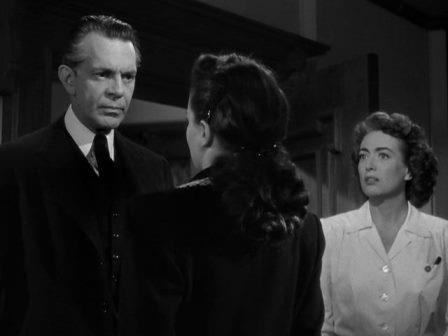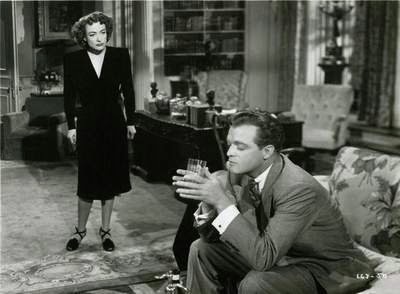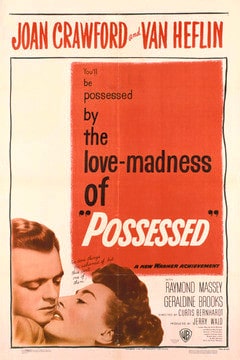“I’ve done things I’m ashamed of… but this isn’t one of them!”
Joan Crawford remains the only actress to star in two films with exactly the same title. Here we will look briefly at the 1947 version of Possessed which shouldn’t be confused with the 1931 version starring Crawford and the up and coming Clark Gable.
While the earlier film focuses more on a physical type of possession, the latter film centers on Louise Howell’s descent into troubles of a much more mental variety. As Louise, Crawford demonstrates again that she could excel when given meatier roles as she was in her still new contract with Warners as opposed to the lighter fare was typically fed earlier in her career at MGM. Possessed is yet another film of the immediate post-war era to focus on mental and psychological issues. It’s often lauded as a wondrous noir picture, but at least this viewer found the results a bit muddled and confused.
The film opens with Louise (Crawford) wandering aimlessly sans makeup and her traditional styled hair, muttering something about looking for David as she wanders into a diner. She’s rather quickly taken to a hospital for treatment, and it is there that with the help of the staff she begins to remember how she got in her current predicament. As she remembers parts of her story we see them as well in the form of flashbacks, which constitute the bulk of the movie. Periodically throughout the film we revert to the facility to refocus the story.
Louise is a nurse employed by Dean Graham (Raymond Massey) to care for his ailing wife Pauline. She is also having a relationship with neighbor and aspiring architect David Sutton (Van Heflin). Early on David breaks it off with Louise and that appears to be when her decline starts. While she’s away with David on her day off, Pauline mysteriously drowns in a lake. No one is really sure for the balance of the picture whether Louise murdered Pauline or not.
 In any case, Dean takes her under his wing and in short order he and Louise are married- alienating his daughter Carol (Geraldine Brooks) in the process as she suspects Louise in the death of her mother and also feels she’s a gold-digger.
In any case, Dean takes her under his wing and in short order he and Louise are married- alienating his daughter Carol (Geraldine Brooks) in the process as she suspects Louise in the death of her mother and also feels she’s a gold-digger.
David, who has been absent from the bulk of the picture, reappears for the last twenty minutes or so to further confuse the issue. Throughout the picture there is little context for David, and overall rather unlikable character. It’s never made clear what exactly Louise sees in this smug, smarmy and openly promiscuous man and why she can’t move on from him.
Sadly David’s character demonstrates perhaps why Possessed struggles at its core. As others have noted, it can’t ever seem to make up its mind on what it wants to show us. Is it a story of this woman’s slow decline into mental illness or is it a murder mystery to determine what happened to Pauline? Even with the two plots working there’s unfortunately little going on for long swathes of the 1:48 run time. Optimally much of this time would have been used to flesh out the characters and key plot points, most especially the relationship with David and when Louise started having her episodes. The audience is left to make assumptions left and right between random episodes of nodding off.
 In spite of the issues Possessed has, two of the stars provide exemplary performances. Crawford, as noted above, is extremely effective tearing through a challenging role, having reportedly visited facilities at the time to get a better feel for the issues at hand.
In spite of the issues Possessed has, two of the stars provide exemplary performances. Crawford, as noted above, is extremely effective tearing through a challenging role, having reportedly visited facilities at the time to get a better feel for the issues at hand.
Raymond Massey as well is strong in a role that’s a bit against the typical curmudgeons he often found himself playing. Against type here he is caring and attentive and it is clear that he deeply cares for Louise, though she doesn’t feel the same way. Geraldine Brooks as Dean’s daughter Carol is also provides a riveting performance featuring many strong scenes with Joan Crawford.
Overall Possessed is a challenging film to enjoy due to multiple undeveloped storylines but this is mitigated to great extent by the acting throughout.
[embedyt] https://www.youtube.com/watch?v=_MAscONOAeE[/embedyt]
